A TYPICAL PROLETCULTIST: THE POET ALEXANDRU ANDRIȚOIU AND THE DILEMMAS OF THE WRITER IN A TOTALITARIAN REGIME
A TYPICAL PROLETCULTIST: THE POET ALEXANDRU ANDRIȚOIU AND THE DILEMMAS OF THE WRITER IN A TOTALITARIAN REGIME
Author(s): Marcela-Claudia Moza (Erdelyi)Subject(s): Poetry, Romanian Literature, Philology, Theory of Literature
Published by: Editura Arhipelag XXI
Keywords: Alexandru Andritoiu; cult of the proletariat; schizoid discourse; genotext; phenotext;
Summary/Abstract: The literary wold of the West had a common language and common themes: the importance of language, its nature, the figure of the writer in his work, the mechanisms of textuality, the construction in language of individual or social identity, the impossibility for the individual writer to escape the constraints of public discourse and so on. In Romania, we notice the existence of radically different languages, a sort of schizophrenia, between down-to-earth socialism and self-reflexive poetics that characterized the entire period after the war until the collapse of totalitarianism, that December 1989 that symbolically ended, we would say, also the literary career of Alexandru Andrițoiu. Let us track down Andritoiu in the context in which he evolved and for which he is representative, that is, on the side of the official discourse, politicized, laden with clichés, which circulated throughout the space forced to communism at the end of the war. Alexandru Andrițoiu was: "a new poet of the new times", lyrically capturing the pulse of a revolutionary era. He was – perhaps more than any of his contemporaries – the case of the writer perfectly molded on the canons of the era and adapting himself, "step by step" – as he says in a poem – to the changes that occurred in the socio-political and cultural context. Making his debut, as a poet, in the early years of the dogmatic era, Andriţoiu had to write according to the norms imposed by socialist realism. He frequently publishes, in periodicals, versified versions of Marxist-Leninist-Stalinist theses regarding class struggle, the difference between the past and the present, and other antinomies perceived as being present in the village world and beyond. His eulogy is addressed to the people, the working class, the party, the country and the supreme leader. Socialist realism requires the poet to really highlight his revolutionary progress. The theme, simple and rigid at the same time, in his poems was the effect of the imperative that literary writings had to be created "in the language and to the understanding of the people".
Journal: Journal of Romanian Literary Studies
- Issue Year: 2022
- Issue No: 30
- Page Range: 620-626
- Page Count: 7
- Language: Romanian

